Beginning of the Indiction:
Ecclesiastical New Year
Righteous Simeon the Stylite; Synaxis of the Theotokos at Miasinae
September 1, 2019
“When Thou didst submit Thyself unto death, O Thou deathless and immortal One, then Thou didst destroy hell with Thy Godly power. And when Thou didst raise the dead from beneath the earth, all the powers of Heaven did cry aloud unto Thee: O Christ, Thou giver of life, glory to Thee.
+Resurrectional Apolytikion in Tone 2


Learn more about St. Symeon
From the Synaxarion (What is that?)
On September 1 in the Holy Orthodox Church we celebrate the Beginning of the Indiction—the Ecclesiastical (Church) New Year. Verses Do thou bless for our sakes the new year’s Indiction Thou Ancient, Who, for man’s sake, tookest on newness. The First Ecumenical Council in Nicaea in 325 decreed that the Church year should begin on September 1. The month of September was, for the Hebrews, the beginning of the civil year, the month of gathering the harvest and of the offering of thanks to God. It was on this feast that the Lord Jesus entered the synagogue in Nazareth, and opened the book to read from the Prophet Isaiah, as found in today’s Liturgy Gospel reading. The month of September is also important in the history of Christianity, because Emperor Constantine the Great was victorious over Maxentius, the enemy of the Christian Faith, in September. Following this victory, Constantine granted freedom of confession to the Christian Faith throughout the Roman Empire. On this day we also commemorate the miracle wrought by the Most-holy Theotokos at Miasinae Monastery and the Great Conflagration (fire) which followed. The Virgin’s holy icon had been cast into Lake Zaguru so that the iconoclasts would not desecrate it. It miraculously arose intact from the lake’s depths after many years in 864. On this day we also commemorate Simeon the Stylite. He was born in Syria of peasant parents. At the age of eighteen, Simeon left home and was tonsured a monk. He undertook the most difficult ascetic practices, including a strict fast for forty days. Simeon eventually took upon himself a form of asceticism that was previously unknown. He stood day and night on a pillar, in unceasing prayer. At first, his pillar was six cubits (7.5 feet) high; Simeon eventually raised it to forty cubits (60 feet) high. The saint worked many great miracles, healing infirmities by word and prayer, comforting those in need, instructing others, and reproaching some who held heretical beliefs. Simeon lived to be 103 years old. He reposed in the Lord on September 1, 459. His pillar and the cathedral named in his honor still stand outside of Aleppo, Syria.
On September 1, we also commemorate Simeon’s mother, Martha; the 40 virgin-martyrs and Ammon the deacon in Heraclea; Venerable Evanthia of Skepsis; Righteous Joshua, son of Nun (Jesus of Navi); Meletios the New of Mount Myoupolis; Venerable Nicholas of Crete; New-martyr Angelis of Constantinople; the martyr Aethalas of Persia; and the martyrs Callista, Evodus and Hermogenes the siblings.
By their intercessions, O Christ God, have mercy upon us. Amen.
The Reading from the First Epistle of St. Paul to St. Timothy (2:1-7)
Timothy, my son, first of all, then, I urge that supplications, prayers, intercessions, and thanksgivings be made for all men, for kings and all who are in high positions, that we may lead a quiet and peaceable life, godly and respectful in every way. This is good, and it is acceptable in the sight of God our Savior, Who desires all men to be saved and to come to the knowledge of the truth. For there is one God, and there is one mediator between God and men, the man Christ Jesus, Who gave Himself as a ransom for all, the testimony to which was borne at the proper time. For this I was appointed a preacher and apostle (I am telling the truth, I am not lying), a teacher of the Gentiles in faith and truth.
The Reading from the Holy Gospel according to St. Matthew. (17:14-23)
At that time, Jesus came to Nazareth, where He had been brought up; and He went to the synagogue, as His custom was, on the Sabbath day. And He stood up to read; and there was given to Him the book of the prophet Isaiah. Jesus opened the book and found the place where it was written, “The Spirit of the Lord is upon Me, because He has anointed Me to preach good news to the poor and to heal the broken hearted. He has sent Me to proclaim release to the captives and recovering of sight to the blind, to set at liberty those who are oppressed, to proclaim the acceptable year of the Lord.” And Jesus closed the book, and gave it back to the attendant, and sat down; and the eyes of all in the synagogue were fixed on Him. And He began to say to them, “Today this Scripture has been fulfilled in your hearing.” And all spoke well of Him, and wondered at the gracious words which proceeded out of His mouth.
Source: antiochian.org
+++
Why is September 1 the Church New Year?
The first day of the Church New Year is also called the beginning of the Indiction. The term Indiction comes from a Latin word meaning, “to impose.” It was originally applied to the imposition of taxes in Egypt. The first worldwide Indiction was in 312 when the Emperor Constantine (May 21) saw a miraculous vision of the Cross in the sky. Before the introduction of the Julian calendar, Rome began the New Year on September 1.
(source: oca.org)
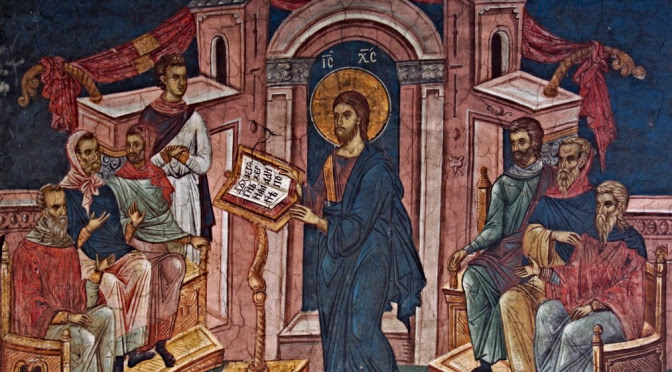
Tradition also holds that it was during the month of September that the Hebrews entered the promised land. And, the custom of beginning a new year with autumn was common in Biblical and Mediterranean lands because the summer harvest was completed, the crops were stored, and it was a time when people began preparing for a new agricultural cycle. It was an appropriate time for a new beginning. This is evident in the services for the New Year as the Church beseeches God for fair weather, seasonable rains, and an abundance of the fruits of the earth.
As we begin this new year it should be noted that the church calendar is loaded with important events, especially the 12 great feasts, the four fasts, and Pascha. Also, each day of the church year is set aside to honor saints; many of whom died on that particular date. Similar to our personal calendars where we mark the earthly birthdays of family and friends, the Church remembers the saints on their “heavenly birthday” — the day they passed from this life to Paradise.
Continue Reading…
At the end of the Divine Liturgy this Sunday, God willing, we will pray the brief service commemorating the beginning of the Church New Year (Sept. 1) and ask for God’s protection and blessings upon the coming year.
+++
Coming Up:
+Sunday, September 8
Feast of the Nativity of the Theotokos
+Saturday, September 14
Feast of the Elevation of the Life-Giving Cross
Orthros 8:30AM
Divine Liturgy 9:30AM
+Sunday, September 15
40th Day Churching Prayers for Kh. Dana Girgis & Churching of Gabriel Girgis
+++
St. Paul Church Iconography
Western Arch now complete
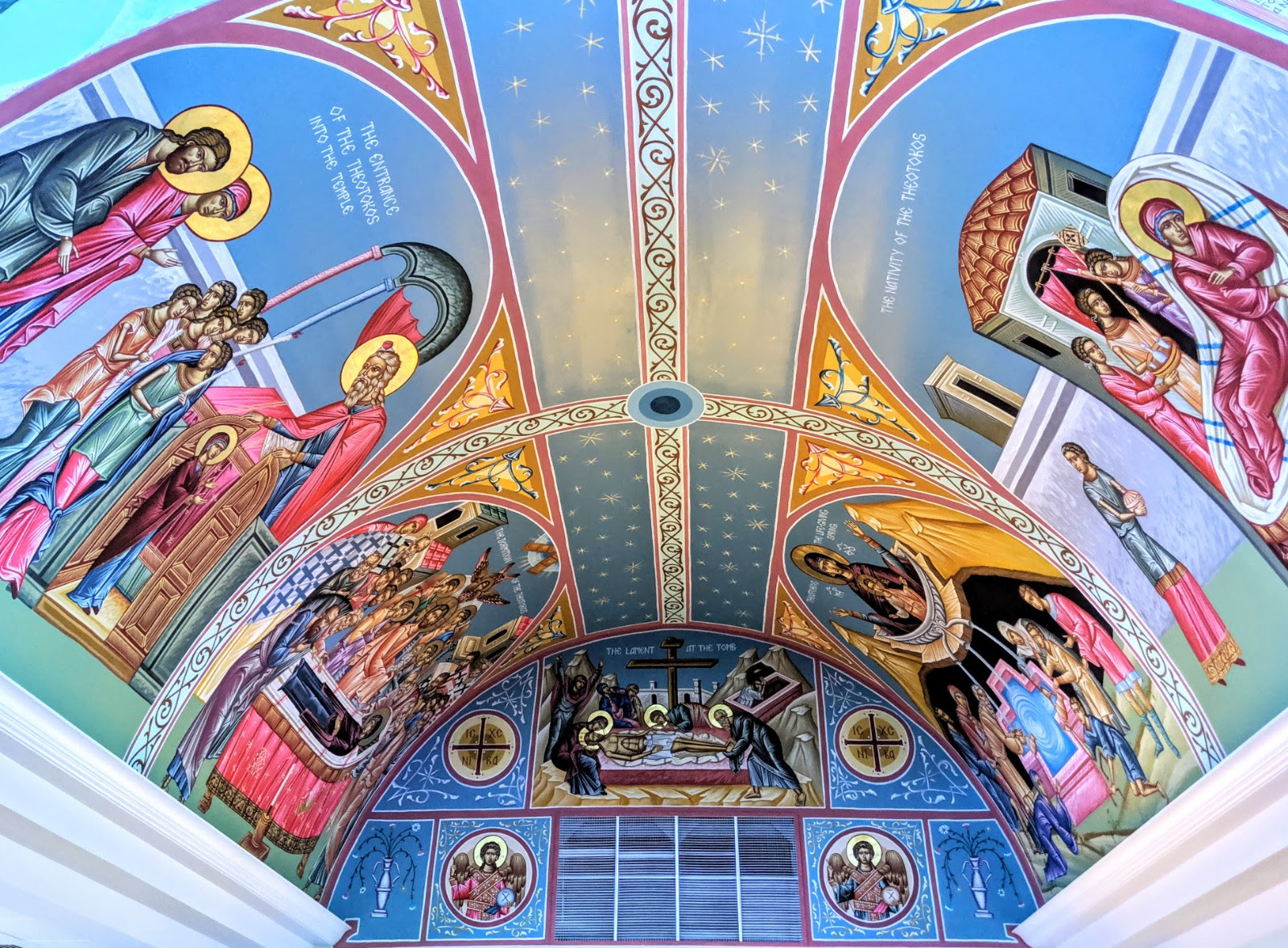

For more photos, visit our parish Facebook Page.
+++
“…Sanctify those who love the beauty of thy house…”
+Prayer Behind the Amvon at the Divine Liturgy
About one year ago, through the grace God, our parish received several donations towards a 100% Lime wood Bishop’s Throne and other items – a ceremonial table (for Artoklasia, Weddings, Baptisms), candle stand(s), censer holder, and more. This now affords our current Bishop’s chair the opportunity to serve an even greater purpose in the holy altar.


Currently, the international shipping container resides in the Port of Miami until Hurricane Dorian “goes away”. God willing, we can expect the arrival of these donated items later next week.
+++
Adjusted Service Schedule – Next Weekend
Click the image below for more info

September 6-7
Fr. Paul on travel for Diocese Fall Retreat
September 7
NO Great Vespers
September 8 (NO 8:30AM Orthros)
9AM Preparation Prayers
9:30AM Divine Liturgy
+++
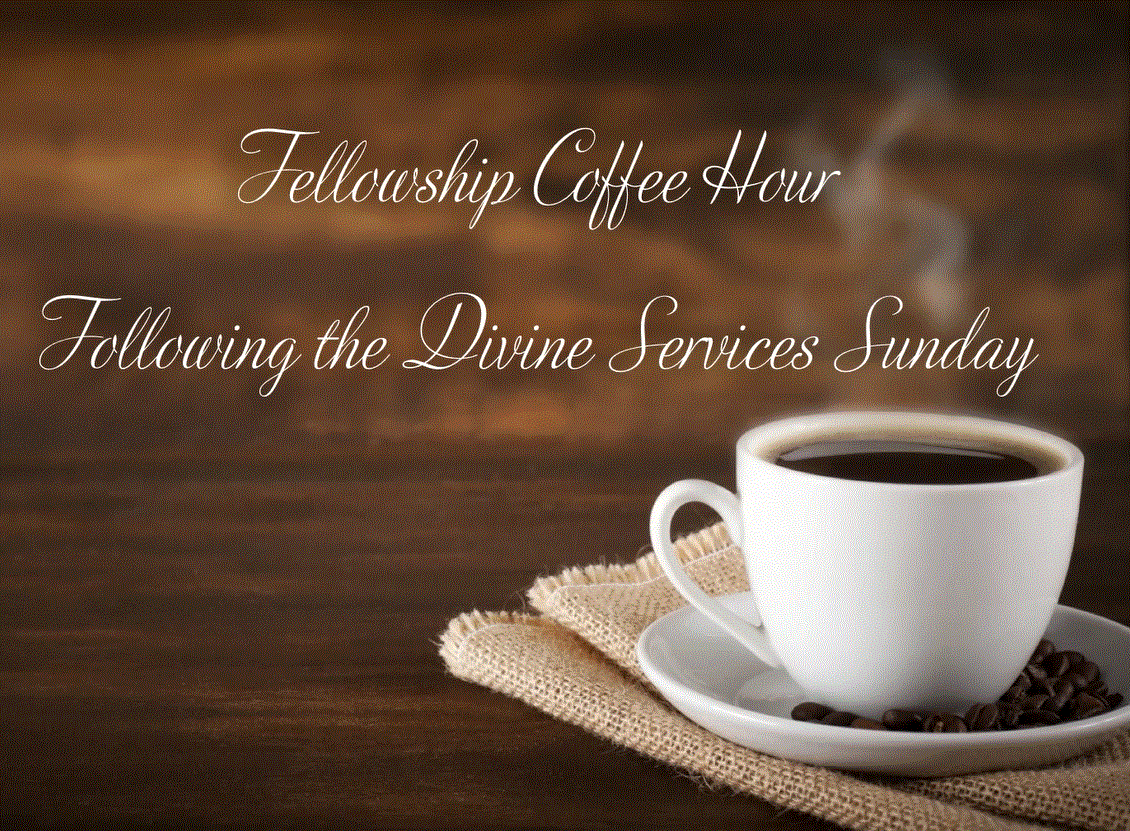
Join us immediately after the Divine Worship each Sunday for Fellowship Coffee Hour.
There is great joy in serving, offering hospitality, and “breaking bread” together, which are essential elements of the Christian life.
In order to avoid allowing this “labor of love” to fall upon the same few people week-after-week, please sign-up to sponsor the Fellowship Coffee Hour on any available Sunday.
“Great – what exactly am I signing up for?”
Simply bring 1 1/2 – 2 dozen Bagels sliced in half (or specialty breads, breakfast cake, etc.) to the kitchen, upon arrival to service Sunday morning. After service, set the food out and then clean up at the end – there is help so you’re not alone! We already have the toppers (peanut butter, jam, etc.), paper goods, and coffee at the parish!
“Can I support Fellowship Coffee Hour in a different way?”
No problem – make an offering that would donate towards the bagels and we will handle the rest!
Either way, keep it simple and give it a shot!
Don’t wait – send a note back to this email (info@stpaulnaples.org) or reach out to our Antiochain Women (AW) Chair, Anna Castley (anna@icsamerica.com), to learn which Sunday is available.
+++
We will be back!
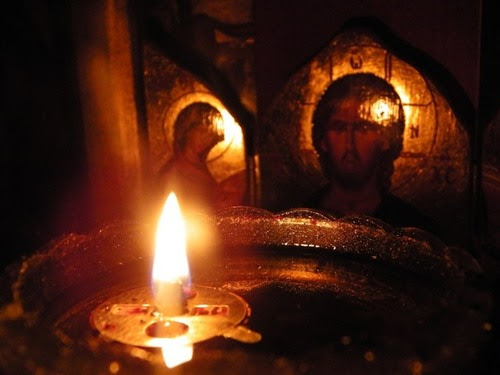
Our Weekly Community Bible Study will break for August and resume Thursday, September 12 – God willing!
+++
Spiritual Morsels from St. Paisios
“Snippets/Sayings” on Indifference and the Mollifying of the Faith
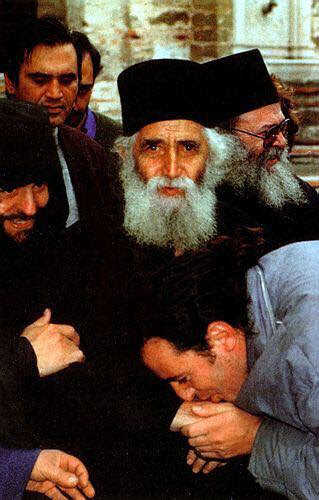
“Indifference is unacceptable even for laymen, and all the more so for the clergy…”
Today they’re trying to destroy faith, and for the edifice of faith to fall they quietly pull out one stone, then another. But we’re all responsible for the destruction; not just those who destroy but we who see how faith is being undermined and make no effort to strengthen it. As a result the seducers are emboldened to create even greater difficulties for us, and their rage against the Church and the monastic life increases.
Today’s situation can be resisted only spiritually, not by worldly means. The storm will continue to rage a bit, will throw all the flotsam, everything unnecessary, onto the shore, and then the situation will become clearer. Some will receive their reward, while others will have to pay their debts.
Today there are many who strive to corrupt everything: the family, the youth, the Church. In our day it’s a true witness to speak up for one’s people, for the state is waging war against divine law. It’s laws are directed against the Law of God.
But we are responsible for not letting the enemies of the Church corrupt everything. Though I’ve heard even priests say: “Don’t get involved in that. It’s none of your business!” If they had reached such a non-striving condition through prayer I would kiss their feet. But no! They’re indifferent because they want to please everyone and live in comfort.
Indifference is unacceptable even for laymen, and all the more so for the clergy.
An honest, spiritual man doesn’t do anything with indifference.
“Cursed be he that doeth the work of the Lord deceitfully”, says the Prophet Jeremiah (Jer. 48:10).
There’s a war on today, a holy war. I must be on the front lines. There are so many Marxists, so many Masons, so many Satanists and assorted others! So many possessed, anarchists and seduced ones! I see what awaits us, and it’s painful for me. The bitter taste of human pain is in my mouth.
The spirit of lukewarmness reigns. There’s no manliness at all! We’ve been spoiled for good! How does God still tolerate us? Today’s generation is the generation of indifference. There are no warriors! The majority are fit only for parades.
Godlessness and blasphemy are allowed to appear on television. And the Church is silent and doesn’t excommunicate the blasphemers. And they need to be excommunicated. What are they waiting for? Let’s not wait for someone else to pull the snake out from its hole so that we can live in peace.
They’re silent out of indifference. What’s bad is that even people who’ve got something inside have begun to grow cool, saying: “Can I really do anything to change the situation?” We have to witness our faith with boldness, because if we continue to be silent we’ll have to answer in the end. In these difficult days each must do what’s in their power. And leave what’s out of their power to the will of God. In this way our conscience will be clear.
If we don’t resist, then our ancestors will arise from their graves. They suffered so much for the Fatherland, and we? What are we doing for it?.. If Christians don’t begin to witness their faith, to resist evil, then the destroyers will become even more insolent. But today’s Christians are no warriors. If the Church keeps silent, to avoid conflict with the government, if the metropolitans are silent, if the monks hold their peace, then who will speak up?
* * *
Give thanks to God for everything. Try to be manly. Pull yourself together a bit. Do you know what Christians are suffering in other countries? There are such difficulties in Russia! But here many exhibit indifference. There’s not enough disposition to kindness, love of devotion.
You see, if we don’t begin to make war against evil, to expose those who tempt believers, then the evil will grow larger. If we throw aside fear then the faithful will be emboldened a bit. And those who wage war against the Church will have a harder time.
In the past our nation (Greece) lived spiritually, so God blessed her, and the saints helped us in miraculous fashion. And we were victorious against our enemies, who always outnumbered us. Today we continue to call ourselves Orthodox Christians, but we don’t live Orthodox lives.
* * *
A lukewarm clergy lulls the people to sleep, leaves them in their former condition so they won’t be upset. “Look”, they say. “By all means don’t say that there’ll be a war, or the Second Coming, that one must prepare oneself for death. We must not make people alarmed!”
And others speak with false kindness saying: “We mustn’t expose heretics and their delusions, so as to show our love for them.” Today’s people are water-soluble. There’s no leaven in them.
If I avoid upsetting myself to protect my fleshly comfort then I’m indifferent to holiness! Spiritual meekness is one thing, and softness and indifference are quite another. Some say: “I’m a Christian and therefore I have to be joyful and calm.” But they’re not Christian. They’re simply indifferent. And their joy is only a worldly joy.
He in whom these worldly seeds are present is no spiritual person. A spiritual person consists of nothing but pain. In other words, he’s in pain at what’s going on, he’s in pain for people’s condition. And divine comfort is bestowed upon him for his pain.
Note from Fr. Paul:
Regarding the last statement about “pain”, St. Paisios may be referring to the cultivation of a “joyful sorrow”. An individual with such a disposition is well “balanced” – not overly “happy” and carried away with emotions but sober-minded, watchful, and pained by the condition of their sinful (judgmental, lukewarm, envious, etc.) selves and broken world we all live in. In addition, the spiritual person is “pained” from the overflow of compassion towards their fellow man – feeling what they feel, experiencing what they are experiencing.
At the same time, “joyful” in the Lord and His great mercy towards us in that, “…While we were yet sinners, Christ died for us.” (Romans 5:8). The Lord offers us real and true joy – only bringing disappointment when we insist on our own will, rather than His.
